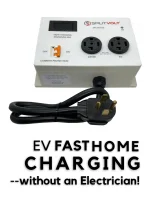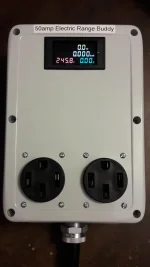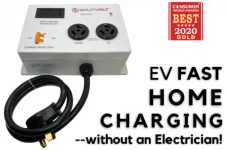As the vehicle deliveries are approaching, the GV60 will become the first electric vehicle for many owners, me included. Many of us will need to get our homes/garages ready to charge our new car and this brings a few newbie questions that may be obvious to some, but not to all:
1. Is there a charger cable supplied with the GV60? what kind is it and how fast will it charge the battery?
2. Is there a need to buy a different charger at home for a faster charge?
3. If yes to question 2, what make/models should one consider? Where is the best place to buy (in Canada)?
4. Besides getting a 220V plug outlet for a Level 2 charger, is there anything else to consider and/or to ask an electrician?
I've been driving a PHEV for almost three years now, so have a little experience.
One thing to keep in mind is that what we typically call EV chargers, are really not chargers, they are fairly simple/dumb devices that do little more than provide a J1772 plug to connect the vehicle to your home's electricity. All the real work is done in the vehicle.
Another important thing to consider is charging amperage. Here, the 'weakest' point in your system will drive the limitation. The GV60 can handle up to a 11kW AC charge rate, which would require 48A at 240V. This is a fair bit, considering that a typical house has a total of 100A service for everything. If you want to hit this number, you'll need:
- Sufficient capacity on your main home's service. This should be fine in most cases, but you may need to be careful not to draw a full charge for the EV at the same time you're running AC, electric clothes dryer, oven, etc.
- A breaker and wiring capable of supporting 60A running from your main panel to the charge unit. There are some rules about long-term use of high-draw devices that say you can't run the circuit at full capacity for an extended period of time, so they may build a 60A circuit to support a 50A unit.
- A 'charger' capable of supporting 48A - this is typically where they top out.
- A car with an AC to DC inverter that can support 11kW (which the GV60 has).
To answer your questions,
1. The 'Portable' charge cable included with the GV60 for North America looks like it's just 120V 16A. The US GV60 manual says to expect 68 hours to fully charge the battery.
2. Yes.
3. There is a fair bit to consider when choosing a charger. I started with one that was ~$200 off of Amazon, as it could do both 120V and 240V charging. It is limited to 16A, but that wasn't a problem as my PHEV couldn't draw anything more. I later moved up to a Juicebox charger as I wanted something that was wifi connected, so that I had better control and data/records of my charging. That ran me about $1000. I'll stop short of recommending a specific model and retailer, but important things to consider are:
- Amperage - how much power the unit can deliver to the car.
- Whether it's plug-in or hardwired
- Wi-fi connectivity, app/online control, data/reporting features.
- Build quality and whether the unit will be exposed to the elements of used in a garage
4. Depending on the unit you're using you may need a plug or just to have the unit hardwired. Depending on a number of factors, you may want/need a sub-panel and/or separate breaker for the unit. Your electrician will be able to advise on this.
You may want to talk to an electrician before buying a unit to see where your limitations lie and how much it would cost to get around them before buying a 'charger'. There's no point in breaking the budget for a charger if your infrastructure can't support it. Even 240V/16A charge rate will be enough to get by. At that rate you could go from empty to full in less than a day, so you should be able to keep things topped up with regular overnight charging.














